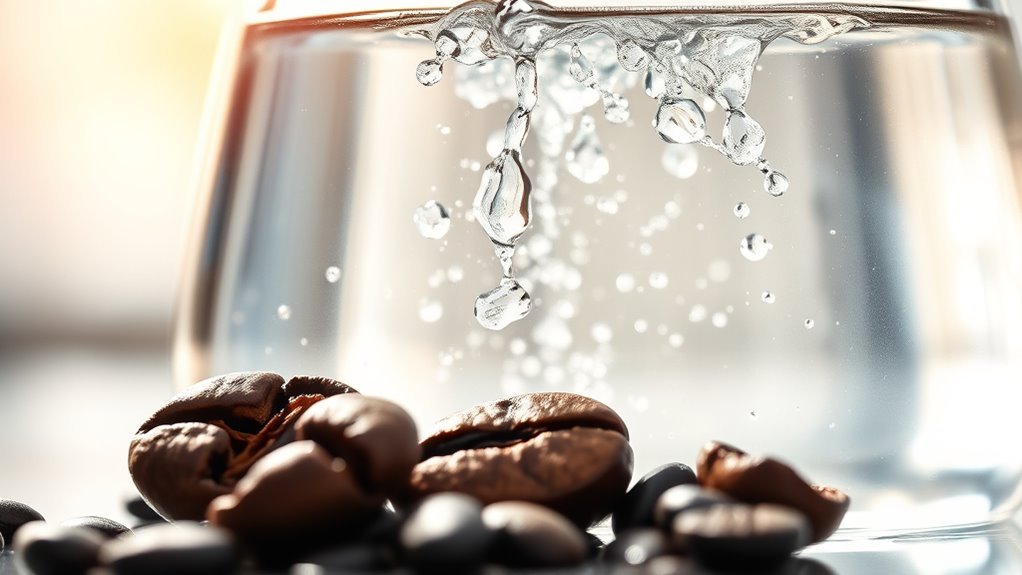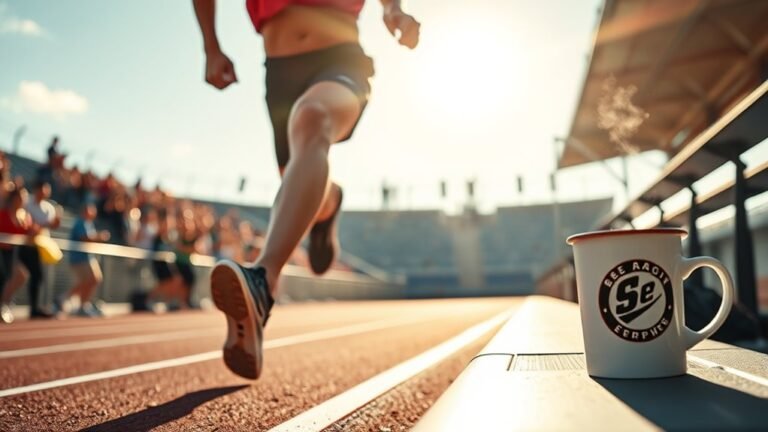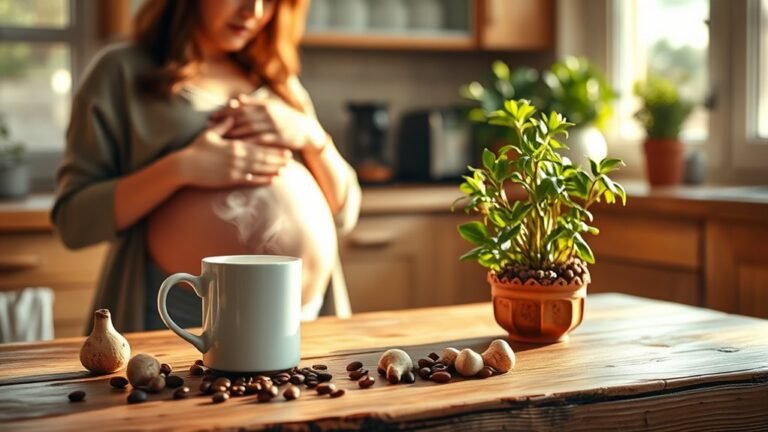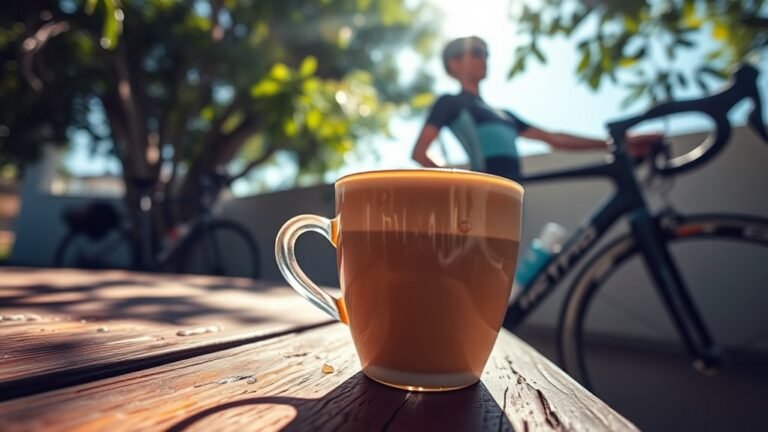The Best Water for Coffee: Does It Really Matter?
Yes, the water you use for coffee matters a lot. Balanced minerals like calcium and magnesium enhance flavor extraction, while poor water quality can cause off tastes or weak brews. Ideal water has a neutral pH around 6.5–7.5 and temperatures between 195–205°F for best flavor extraction. Whether you use tap, filtered, or bottled water depends on local quality and mineral content. Understanding water’s role can transform your brew, and there’s more to explore about optimizing your water for coffee.
How Water Quality Influences Coffee Flavor
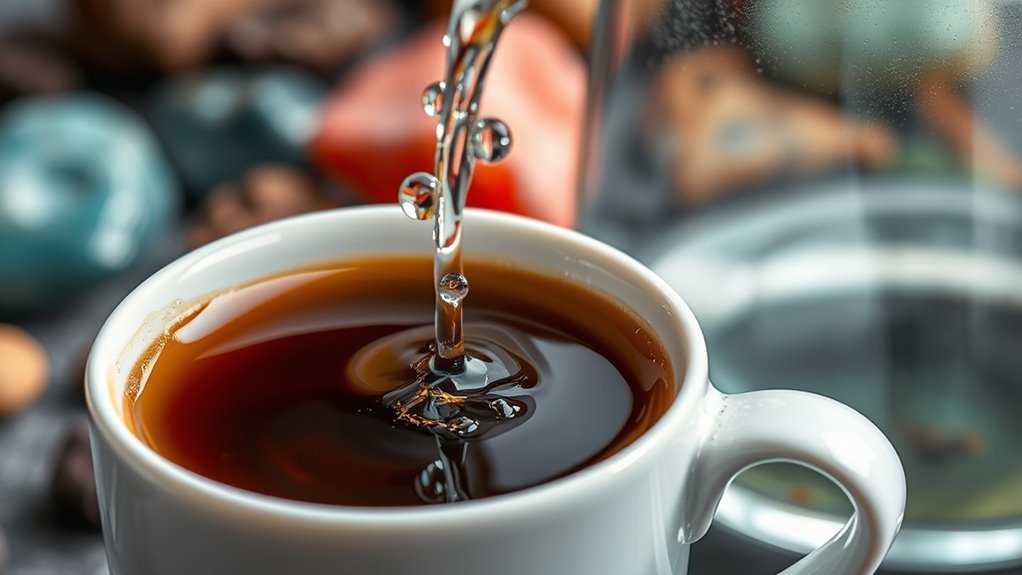
Although many factors affect the taste of your coffee, water quality plays an essential role in shaping its final flavor. When brewing, water acts as a solvent, extracting compounds that define the coffee’s flavor profile. You must consider the water pH; if it’s too acidic or alkaline, it can distort the balance, emphasizing undesirable notes or muting the coffee’s natural complexity. Ideally, neutral to slightly acidic water (pH around 6.5–7.5) preserves the best extraction of aromatic oils and acids, allowing the true character of your beans to shine. By controlling water quality, you gain freedom to tailor each cup, ensuring consistency and clarity in flavor, rather than settling for unpredictable or off-putting results caused by poor water choices.
Understanding Water Hardness and Its Effects
Water’s pH is just one aspect of its overall quality; another significant factor is water hardness, which refers to the concentration of minerals like calcium and magnesium dissolved in it. Understanding water hardness is fundamental because it influences how your coffee brews and ultimately tastes. Too much hardness can lead to scale buildup in your equipment and extract undesirable flavors, while too little may result in flat, lifeless coffee. Striking the right mineral balance is vital; it guarantees ideal extraction and protects your gear. By being aware of your water’s hardness, you gain control over the brewing process, allowing you to tailor your coffee experience. Remember, mastering water hardness isn’t about restriction—it’s about releasing the freedom to brew coffee that truly matches your palate.
The Role of Minerals in Coffee Extraction
Since minerals play an essential role in coffee extraction, understanding their impact helps you optimize flavor and aroma. Minerals like calcium and magnesium influence extraction efficiency by interacting with coffee solubles, enhancing desirable compounds while moderating bitterness. Achieving the right mineral balance guarantees that extraction neither under-extracts—resulting in weak, sour notes—nor over-extracts, which can cause harshness. This balance also affects water’s pH and conductivity, subtly shaping how coffee’s oils and acids release. When you control mineral content precisely, you reveal the coffee’s full potential, releasing nuanced flavors. Ultimately, mineral balance isn’t just about water quality; it’s a key factor in mastering extraction efficiency, giving you freedom to craft a cup that reflects your taste preferences without compromise.
Comparing Tap Water and Filtered Water for Brewing

When you’re deciding between tap water and filtered water for brewing, it’s vital to reflect on how each impacts the flavor and consistency of your coffee. Tap water advantages include its ready availability and often balanced mineral content, which can enhance extraction and flavor complexity. However, variations in municipal water quality may introduce unwanted chemicals or odors, affecting taste unpredictably. Filtered water, while removing impurities and chlorine that can taint your brew, sometimes strips away beneficial minerals important for ideal extraction, representing filtered water disadvantages. This mineral loss can lead to flat or dull coffee profiles. Ultimately, choosing between tap and filtered water requires considering your local water quality and how much control you want over the brewing process—balancing convenience, purity, and mineral presence to suit your freedom in crafting the perfect cup.
Is Bottled Water a Good Choice for Coffee?
How well does bottled water perform as a choice for brewing coffee? Bottled water benefits include its consistent mineral content, which can enhance extraction and flavor clarity. You get a reliable, contaminant-free base, ideal if your tap water quality varies. However, bottled water drawbacks include cost and environmental impact—relying on single-use plastic bottles isn’t sustainable. Also, not all bottled waters are equal; some have mineral levels too low or too high, affecting taste balance. If you want freedom from unpredictable tap water but care about taste and sustainability, choose bottled water with balanced mineral content or consider reusable options. Ultimately, bottled water can be a good choice, but weigh its benefits against drawbacks to find what truly suits your brewing needs and values.
The Ideal Water Temperature for Brewing
You’ll want to use water heated between 195°F and 205°F to extract the best flavors from your coffee. Temperatures below this range can lead to under-extraction, resulting in weak, sour notes, while higher temperatures risk over-extraction and bitterness. Understanding this balance is key to achieving a well-rounded cup every time.
Optimal Temperature Range
Although water quality is fundamental, the temperature at which you brew coffee plays an equally important role in extracting the right flavors. To achieve brewing consistency and minimize temperature variations, you should aim for an ideal temperature range that balances extraction efficiency and taste clarity. Here’s what you need to know:
- The perfect brewing temperature typically falls between 195°F and 205°F (90°C – 96°C). This range guarantees maximum solubility of desirable compounds without extracting bitterness.
- Temperatures below 195°F risk under-extraction, causing weak or sour notes, while those above 205°F increase harshness.
- Maintaining stable temperature within this narrow window is vital for repeatable results, especially if you want freedom to experiment with different beans or methods.
Mastering this range empowers you to reveal your coffee’s full potential with precision and control.
Temperature Impact on Flavor
Temperature doesn’t just influence extraction efficiency; it directly shapes the flavor profile of your coffee. When you adjust temperature variations, you modify how compounds dissolve, impacting acidity, bitterness, and sweetness. Brewing too hot can scorch your grounds, while too cool leaves under-extracted, sour notes.
| Temperature (°F) | Extraction Impact | Flavor Profiles |
|---|---|---|
| 195–200 | Ideal extraction | Balanced, rich, nuanced |
| 185–194 | Mild under-extraction | Bright acidity, lighter body |
| 201–205 | Over-extraction risk | Bitter, harsh, burnt notes |
Understanding these ranges lets you tailor your brew. You’re free to experiment, but staying near 195–200°F maximizes desirable flavor profiles without unwanted bitterness or sourness.
How to Test Your Water for Coffee Brewing
Before you can improve your coffee’s flavor, you need to understand the quality of your water by testing its key characteristics. Water testing is essential to tailor your brewing methods effectively. Here’s how you can do it:
- Measure Total Dissolved Solids (TDS): Use a TDS meter to gauge mineral content. Ideal coffee water typically falls between 75-250 ppm.
- Check pH Level: Test strips or a digital pH meter reveal if your water is too acidic or alkaline, both of which impact extraction.
- Analyze Hardness and Chlorine: Test kits help detect calcium, magnesium, and chlorine levels, which can alter taste and damage equipment.
Tips for Improving Your Brewing Water at Home

To improve your brewing water at home, start by choosing an effective filtration method that removes impurities without stripping essential minerals. Next, maintain your water temperature around 195-205°F to optimize extraction. Finally, aim for a balanced mineral content—too little or too much can negatively impact flavor and extraction quality.
Water Filtration Options
Choosing the right water filtration method can greatly enhance the quality of your coffee by removing impurities that affect flavor and extraction. To improve your brewing water at home, consider these options:
- Activated Carbon Filters: These effectively remove chlorine and organic compounds, improving taste without stripping essential minerals that contribute to coffee’s body and sweetness.
- Reverse Osmosis Systems: They provide highly purified water by removing nearly all dissolved solids. While this guarantees clean water, you might need to remineralize to maintain balance for extraction.
- Simple Pitcher Filters: Convenient and affordable, these reduce common contaminants but may not be as thorough as the other methods.
Ideal Water Temperature
Although water quality plays a crucial role in brewing, the temperature of your water directly influences extraction efficiency and flavor balance. You want to aim for a water temperature between 195°F and 205°F (90°C to 96°C). This range guarantees ideal extraction of soluble compounds without over-extracting bitter elements. Different brewing methods may require slight adjustments; for example, pour-over and drip coffee typically perform best near 200°F, while immersion methods like French press can tolerate slightly cooler water. Using water too hot can scorch the coffee, while water too cool leads to under-extraction and muted flavors. Controlling water temperature precisely allows you to reveal the full potential of your beans, granting you freedom to tailor taste profiles without compromising clarity or balance.
Mineral Content Balance
Water temperature sets the stage for extraction, but the mineral content of your water shapes how those flavors develop. Achieving the right mineral balance is essential because your water composition directly influences taste, mouthfeel, and extraction efficiency. To optimize your brewing water at home, focus on these three key steps:
- Measure your water’s hardness and alkalinity to understand its baseline mineral content.
- Adjust calcium and magnesium levels, as they enhance flavor clarity and extraction stability without overwhelming the cup.
- Limit sodium and iron impurities, which can introduce off-flavors and disrupt the mineral balance.
Common Water Myths in Coffee Preparation
While many believe that any pure water will yield the best coffee, several common myths about water quality and composition can mislead your brewing process. One water misconception is that distilled or reverse osmosis water is ideal because it’s “pure.” In reality, water devoid of minerals often produces flat, dull coffee, lacking the complexity minerals bring. Another brewing myth is that hard water ruins coffee; moderate mineral content actually enhances flavor extraction and balance. You might also hear that all tap water is unsuitable, but this depends on your local water treatment and mineral profile. Understanding these water misconceptions empowers you to make informed choices, rather than blindly following brewing myths that limit your coffee’s potential. Selecting water isn’t about purity alone—it’s about the right mineral balance tailored to your taste.
Frequently Asked Questions
Can Distilled Water Be Used for Coffee Brewing?
When it comes to coffee, using distilled water might seem like the whole nine yards, but it has its pros and cons. Distilled benefits include purity, which means no minerals affecting taste. However, you might find it lacks the minerals that enhance flavor during brewing. Your brewing preferences play a significant role—if you crave a clean cup, distilled water works, but for richer taste, mineral content is key. Choose what suits your freedom to experiment.
Does Water Ph Impact Espresso Crema Formation?
You’ll find that water pH does impact espresso crema formation by influencing crema stability. If the pH is too acidic or too alkaline, it can disrupt the delicate balance needed for a rich, lasting crema. Maintaining a proper pH balance helps extract oils and proteins that form crema, enhancing both texture and flavor. So, keeping your water’s pH balanced is key to achieving that perfect crema you’re aiming for.
How Does Water Flow Rate Affect Coffee Extraction?
When you control the flow rate, you directly influence extraction efficiency. A slower flow rate lets water interact longer with coffee grounds, boosting extraction and flavor complexity. Too fast, and you risk under-extraction, missing vital compounds. Too slow, and over-extraction can lead to bitterness. So, by precisely adjusting flow rate, you gain freedom to dial in your coffee’s taste profile, ensuring every cup reflects your desired balance and intensity.
Is Alkaline Water Better for Cold Brew Coffee?
When considering alkaline water for cold brew, you’ll notice alkaline benefits can help neutralize cold brew acidity, making the taste smoother and less bitter. Since cold brew naturally has lower acidity, using alkaline water may further reduce sharpness, which some people prefer. However, the mineral content also affects extraction and flavor balance. So, if you want a mellow, balanced cup with less acidity, alkaline water is worth experimenting with for your cold brew.
Can Water Temperature Fluctuations Ruin a Coffee Machine?
You might think water temperature fluctuations are harmless, but they can quietly damage your coffee machine’s internal components. Sudden changes cause metal parts to expand and contract, risking leaks or cracks. Alongside water quality, it’s essential to follow maintenance tips like regular descaling and using stable-temperature water. By controlling these factors, you’ll extend your machine’s lifespan and enjoy consistent, freedom-filled brewing without unexpected breakdowns.
